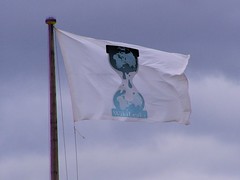Former assistant secretary of defense from 1993 to 1994 and the United States ambassador to Saudi Arabia during the Persian Gulf War, Chas Freeman,
published an op-ed in the Sunday, December 5th edition of the New York Times. The piece attempts to make an argument that WikiLeaks is a danger to America because Iran will be helped as a result of information that was revealed. While that may be an arguable possibility, the outlandish premise that "Iran loves Wikileaks" ensures the op-ed is nothing more than a sloppy attempt by a member of the Washington establishment to further smear WikiLeaks.
First off, Freeman might have been able to write an editorial that could provide insight on the impact of the hundreds of diplomatic cables that have been released so far as a result of WikiLeaks. Freeman, however, chose to not make that the thrust of his op-ed; instead, he went with "Julian Assange, has much in common with the anarchists of the early 20th century: he aims to disrupt the established order by impairing its alliances and violating its proprieties."
A respectable op-ed could have been published given the fact that Freeman has
a history of diplomatic experience in Middle Eastern, African, East Asian and European countries especially with Saudi Arabia. He serves as director of the American Iranian Council, which would lead one to assume he is knowledgeable on issues surrounding Iran and would at least be able to discuss the Washington Consensus on Iran openly. And, as president of the Middle East Policy Council, he published Professor John Mearsheimer and Professor Stephen Walt's working paper, "The Israel Lobby and U.S. Foreign Policy." His open sympathy toward views on the influence of Israel over U.S. foreign policy made it impossible for him to survive the nomination process for chair of the National Intelligence Council in 2009.
But, Freeman opted to publish a fallacious editorial that displays utter contempt for WikiLeaks. One can surmise that this is probably a result of Freeman's experience as a diplomat and a personal volley at WikiLeaks because of a belief that this will hurt diplomacy in the Middle East. Why couldn't he have just written that in an editorial?
The editorial operates on a Washington Establishment assumption: that prior to the release of cables it was not already known to Arab leaders what neighboring countries were thinking. If, as Freeman suggests, the U.S. is "deeply unpopular among Arabs" there might have already been an inability to get straightforward answers. The Bush Administration years probably had the effect of making Middle Eastern countries approach all talks or negotiations with caution. Even with the election of President Obama, they probably still have been overly cautious, preferring to say things they think U.S. diplomats want to hear instead of saying what they think.
There is little indication that Iran will gain prestige as a result of WikiLeaks. Iran hasn't seen a concerted effort by Arab countries to unite in the country's defense. And that's probably because, as Freeman surely knows, Iran is more isolated than ever.
Finally, Press TV in Iran has not run any stories indicating the leadership of Iran is pleased with the leak. Secretary General of Iran's High Council for Human Rights Mohammad Javad Larijani said the documents were
released to "save the face of the United States," and Iranian Foreign Ministry Spokesman Ramin Mehmanparast
suggested the release was a "highly dubious scheme," one that had taken place through cooperating with intelligence services of Western governments. Like all governments in the world, they have been leery of what might be revealed.
This editorial, therefore, appears to be a chance to remind Americans that healthy and effective diplomacy cannot take place if operations like WikiLeaks are allowed to enjoy legitimacy or freely release classified documents to people all over the world. That notion is part of a myth larger than the idea that "Iran loves WikiLeaks."
Secretary of Defense Robert Gates has said the descriptions of possible harm from WikiLeaks to U.S. foreign policy were "significantly overwrought," but don't expect that to get in the way of former diplomats appearing on the pages of pro-Washington Establishment publications like the New York Times.






